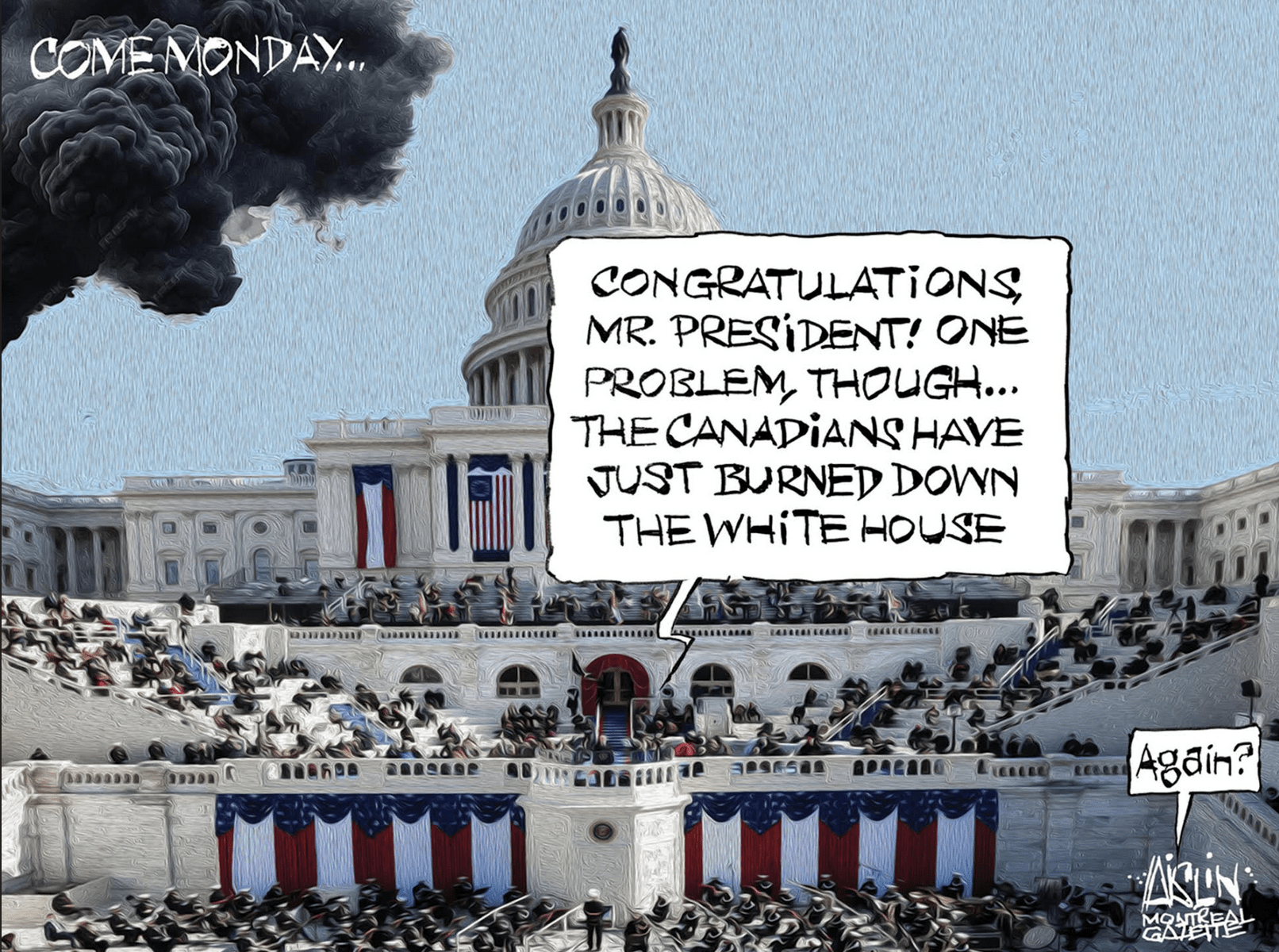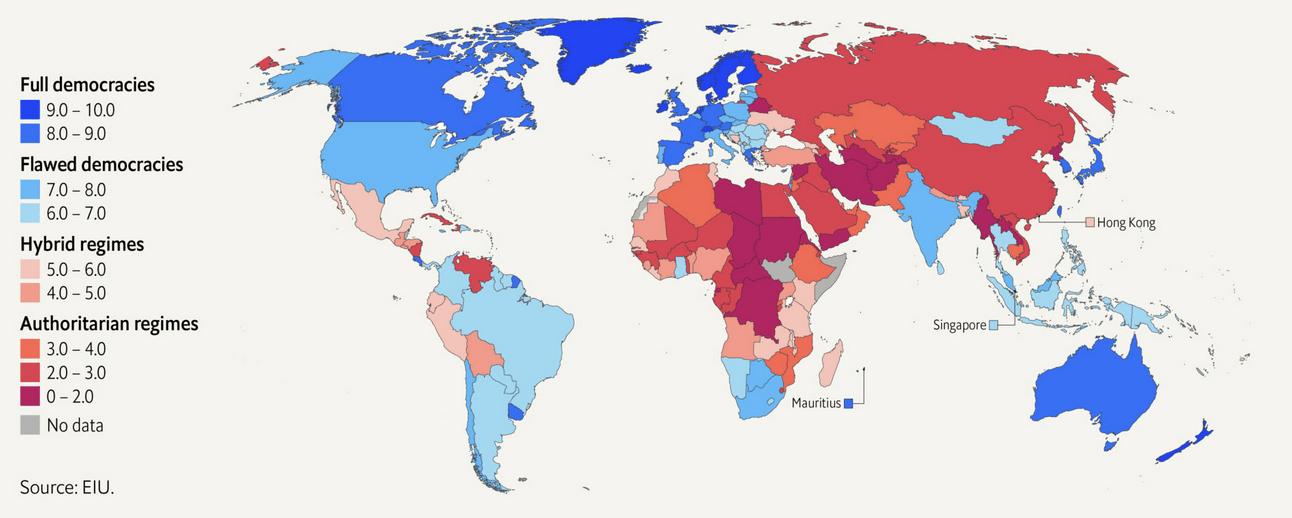The Big Lie at the Heart of Trump’s Designs on Canada
 With many thanks to Terry Mosher
With many thanks to Terry Mosher
By Lisa Van Dusen
January 19, 2025
As much as America’s political pendulum swing from Donald Trump to Joe Biden and back again may prove to be discombobulating for all “legacy” US allies, Canada holds a disproportional interest in its consequences, occupying as we do the front-row-middle seat in the political poncho zone of America’s global audience.
While that prime location has proven overwhelmingly beneficial for most of our bilateral history, Trump’s apparent second-term graduation from a democracy discrediting president to a predatory, autocratic one is already making all the difference to the regular cost-benefit calculation that comes with our proximity to a superpower.
The key difference between our longstanding relationship with America in its 200-year, post-1812 incarnation and our current, pre-Trump Two state of collective, entirely rational future tripping based on recent history — including our soon-to-be reinstalled neighbour’s record of coup-plotting, insurrection-inciting and power-abusing impeachable offences — is that for those 200 years, America has been a democracy.
Let’s face it, if America were still an intact, fully functioning democracy, Donald Trump would not be, at this writing, rehearsing the jump-scare lines in his second inaugural address
Which makes Trump’s recent statements about annexing Canada, using tariffs as an economic battering ram, considerably different than, say, Canada’s intermittently re-animated fantasy of annexing Turks and Caicos as the 11th province. Because Canada is a democracy, there has never been any implication that Turks and Caicos would be involuntarily, unilaterally absorbed under Canada’s suzerainty as a target of piña colada imperialism.
And, let’s face it, if America were still an intact, fully functioning democracy, Donald Trump would not be, at this writing, rehearsing the jump-scare lines in his second inaugural address. The corruption capture and anti-democracy operationalization of key US entities and institutions — from the Republican Party to the US Supreme Court to the intelligence community — that produced Trump’s second election victory after the most absurd presidential campaign in history had already taken its toll long before last November 5th.
The degradation of American democracy as a power consolidation strategy dates back to the dawn of this millennium, when the disruptive possibilities of the internet for strategic corruption, narrative engineering and (euphemism alert) propaganda-driven mass manipulation were discerned by certain political, geopolitical and intelligence interests whose communal vision board shared as a goal the assisted death of democracy for vindictive, vindication and domination purposes.
(Having first fatefully run afoul of those interests myself for reasons both personal and professional while living in Washington in the late 90s, I can attest to the verisimilitude of Donald Trump’s colourful channelling of their cynicism, mendacity, ruthlessness, and embrace of boundary violation as a colonization and domination tool, with predictable results).

Economist Intelligence Unit Democracy Index 2023
The Economist Intelligence Unit’s annual Democracy Index demoted the United States from a full democracy to a flawed one in 2016, the year Trump won the presidency the first time. It has retained that status ever since, and presumably won’t have leapt back into the full democracy column based on his re-election when the index for 2024 is published next month. If it doesn’t make it into the “hybrid regimes” category on its way to “authoritarian regimes” this year, the 2025 update is only 11 1/2 months and a deluge of executive orders away.
Canada, on the other hand, is still ranked a full democracy, though the same performative propaganda, operational fictionalization, commodified complicity, and other interference both foreign and domestic that have degraded democracies elsewhere have begun to plague this country.
This isn’t really about loving or hating America, or Canada, for that matter. It’s about the fact that American democracy is in more trouble than it has been in the nearly-250 years since its founding. And, in the ongoing clash of the world orders, the players that view democracy in theory and in practice as an existential threat also see every fallen, broken and captured democracy as a trophy. There is no autocratic trophy bigger than America, and, as its G7 and NATO neighbour, Canada is a close second.
Even greater than the ridiculousness of the prima facie proposition that Canada be seized as the 51st state via ‘economic force’ is its ridiculousness-compounding context.
Indeed, to those interests, including the ones President Joe Biden bravely, cautiously, partially described as the “technology industrial complex” in his farewell address from the Oval Office on Wednesday, hitching Canada to Trump’s systemic sabotage wagon through tactical distraction, economic assault and annexation would be a far more efficient coup than dispatching a swarm of cosplaying goons to Parliament Hill. (Insert your favourite Sun Tzu cliché about subduing an enemy without kinetic warfare here). Biden also described this phenomenon as an oligarchy. Not to nitpick, but trust me, it’s more of a misdirectional pathocracy.
So, even greater than the ridiculousness of the prima facie proposition that Canada be seized as the 51st state via “economic force” is its ridiculousness-compounding context. The only American president who would presume such a geopolitical droit du seigneur is either crazy, a tyrant, or, as Trump so frequently is, acting on behalf of crazy tyrants who believe everything and everyone in the world is theirs to conquer and subjugate via all the means of 21st-century predation available to them.
The next thing he’ll do is demand a referendum, which, between the tactical stylings of Steve Bannon, Elon Musk and assorted other actors covert and overt, would make the colossal cluster**** of the Brexit referendum look like a paragon of democratic rectitude. The real question is, what would a post-democracy Canada look like and what other orchestrated division, depletion, and degradation narratives could we be dragged through in the meantime to rationalize that outcome?
It’s been my experience, over nearly three decades of covering them, that there are words to live by when dealing with certain American presidents. One of them is “no”.
Policy Editor and Publisher Lisa Van Dusen has served as Washington bureau chief for Sun Media, international writer for Peter Jennings at ABC News, senior writer for Maclean’s and an editor at AP National in New York and UPI in Washington.
